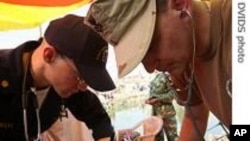Authorities in Bangladesh continue with reconstruction efforts following the devastation of Cyclone Sidr. The powerful cyclone, which struck Bangladesh in November 2007, left thousands dead, many more homeless, and damage estimated at $1.7 billion.
The United States has been a major supporter of Cyclone Sidr reconstruction efforts. On April 25, U.S. Ambassador to Bangladesh James Moriarty and Bangladesh Minister of Agriculture, Begum Matia Chowdhury, inaugurated a U.S.-Government funded Sidr reconstruction project in Barisal.
The Improved Livelihood for Sidr-Affected Rice Farmers project is the continuation of an $80 million U.S. Government reconstruction effort. This $4.77 million program will help restore agricultural production in the Sidr-affected rice producing districts of Bangladesh. The Bangladesh Department of Agricultural Extension is collaborating with the U.S. Government to implement the project.
The U.S. Government, through the United States Agency for International Development, is supporting activities in the 8 most Sidr-affected areas to improve rice production by using Urea Deep Place technology. By improving nitrogen efficiency, this technology increases rice crop yields by as much as 25 percent.
This will increase the net income of each of the project's 280,000 beneficiary families by $80 per harvest, a total of $22 million in 2009 alone. Using this technology, the project will also save approximately 13,000 metric tons of fertilizer and increase rice production by about 74,000 metric tons by the end of the project in 2010. This program will benefit more than 1.4 million people in 35 upazilas [sub-districts] in the Sidr-affected region.
Following the inauguration of the project, Ambassador Moriarty and Begum Matia Chowdhury met with Sidr-affected farmers in the region. They also inaugurated the operation of a urea briquette machine used in the new technology to transform commercially available urea fertilizer into larger granules that result in higher yields.
Briquette machines will also generate additional income opportunities for Sidr-affected people in the Barisal region. The U.S. has already funded around 600 briquette machines across Bangladesh, providing income opportunities for more than 400,000 people.
The United States will continue to work with Bangladesh to rebuild, replant, and repair what was damaged and lost in Cyclone Sidr.













